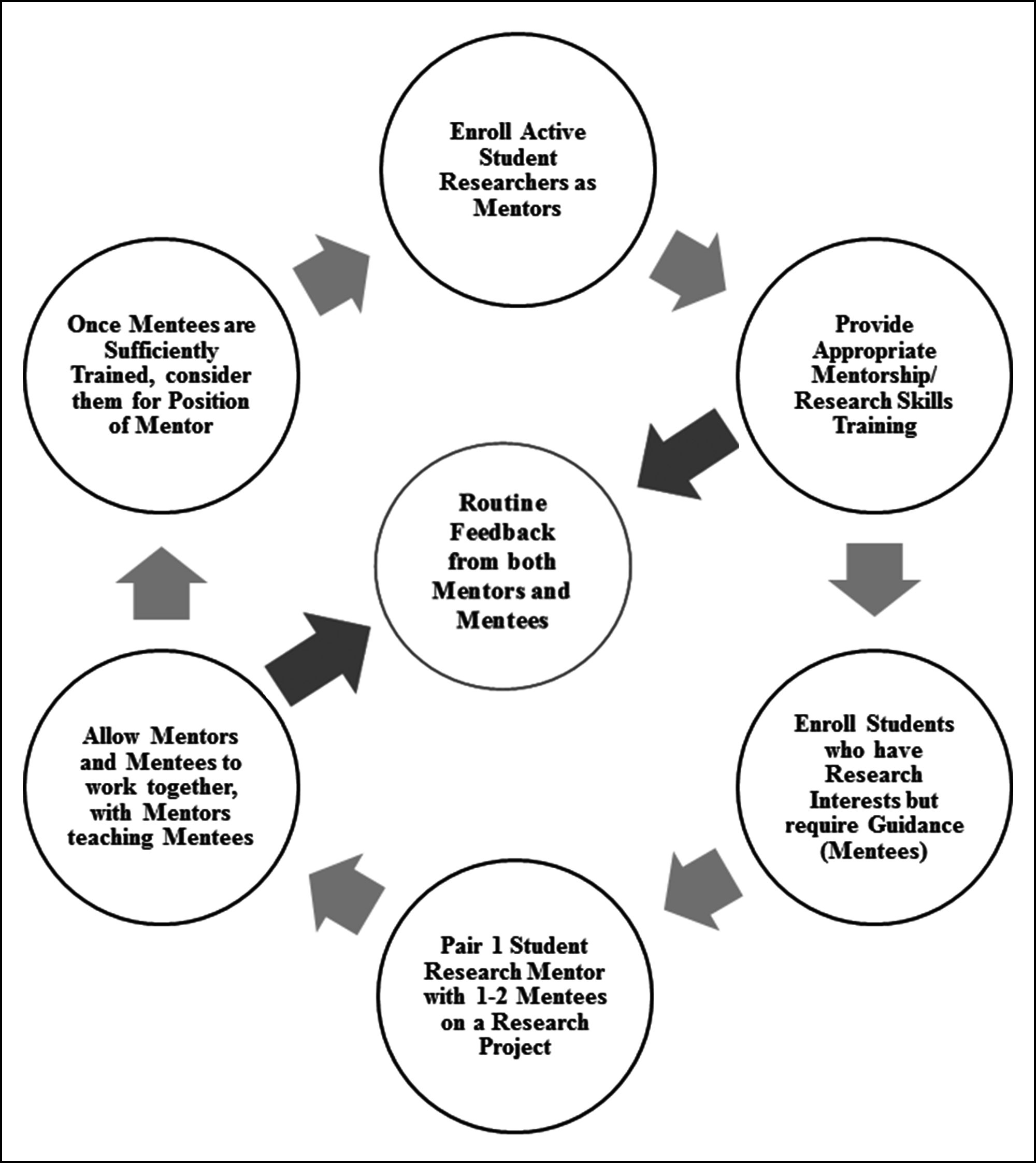Student Research Mentorship Programme: A Novel Solution for Promoting Research in Medical School
By Inaara Akbar1, Russell Seth Martins1, Syeda Sadia Fatima2Affiliations
doi: 10.29271/jcpsp.2021.09.1135
Sir,
Peer-assisted learning (PAL), the process of learning from students at similar training levels,1 may represent a viable solution for promoting student research in medical school. This letter highlights the role of a sustainable PAL-based student research mentor programme (SRMP) in addressing the severe lack of medical student research in Pakistan.2
Medical students often find it daunting to pursue their own research interests. This is due to the lack of various research skills, such as project management, applying for ethical approval, data collection, use of analysis software, and manuscript writing. Additionally, students find it challenging to engage motivated faculty mentors. To this effect, a PAL-based student research mentor programme (SRMP) has been established in January 2020 by the Research & Development Wing, Society for Promoting Innovation in Education (SPIE), a student society at AKU. The SRMP is a research capacity-building initiative that builds on the benefits of PAL, as peer-teachers are better suited to understand learners’ challenges, and create an environment conducive to learning by encouraging questions, and devoting time to explaining concepts.3,4
In SPIE’s SRMP, experienced medical student researchers are recruited to be research mentors (mentors), who are equipped with the skills necessary for conducting research and teaching research to novice medical student researchers (mentees). Mentor training consists of workshops teaching research skills and strategies for teaching/learning and mentorship. Once trained, mentors are assigned 1-2 mentees, to whom they impart research skills, guidance, and mentorship at every step of a research project. An active feedback system has been established for continuous improvement of the SRMP. The entire structure of the SRMP requires minimal faculty involvement.
As of June 2020, a mere six months after its establishment, the SRMP is already beginning to bear tangible fruit. Several mentor-mentee research projects are currently underway, and a few completed projects have already been published in PubMed-indexed journals. Moreover, both mentors and mentees report positive feedback regarding the mentor-mentee relationship. Sustainability is being achieved, as current mentors are responsible for conducting workshops to train their mentees to be future mentors themselves (Figure 1).
 Figure1: Student research mentor programme model.
Figure1: Student research mentor programme model.
Thus, if implemented similarly across other medical colleges in the country, SRMP could prove an innovative strategy to improve the quality and quantity of medical student research in Pakistan. In the long term, this may contribute toward boosting Pakistan’s profile in the world of medical academia.
CONFLICT OF INTEREST:
The authors declared no conflict of interest.
AUTHORS’ CONTRIBUTION:
IA, RSM, SSF: Conceived the idea, wrote the manuscript, revised and gave intellectual inputs to the draft, and approved the final version before submission.
REFERENCES
- Aburahma MH, Mohamed HM. Peer teaching as an educational tool in Pharmacy schools: Fruitful or futile. Curr Phar Teach Lear 2017; 9(6):1170-9. doi.org/10.1016/j.cptl. 2017.07.026
- Kumar J, Memon A, Kumar A, Kumari R, Kumar B, Fareed S. Barriers experienced by medical students in conducting research at undergraduate level. Cureus 2019; 11(4): e4452. doi: 10.7759/cureus.4452
- Bulte C, Betts A, Garner K, Durning S. Student teaching: Views of student near-peer teachers and learners. Medical Teacher 2007; 29(6):583-90. doi: 10.1080/014215 90701583824.
- Siddiqi HS, Rehman R, Syed FF, Martins RS, Ibrahim MT, Alam F. Peer-assisted learning (PAL): An innovation aimed at engaged learning for undergraduate medical students. J Pak Med Assoc 2020; 70(11):1996-2000. doi: 10.5455/ JPMA.29714.